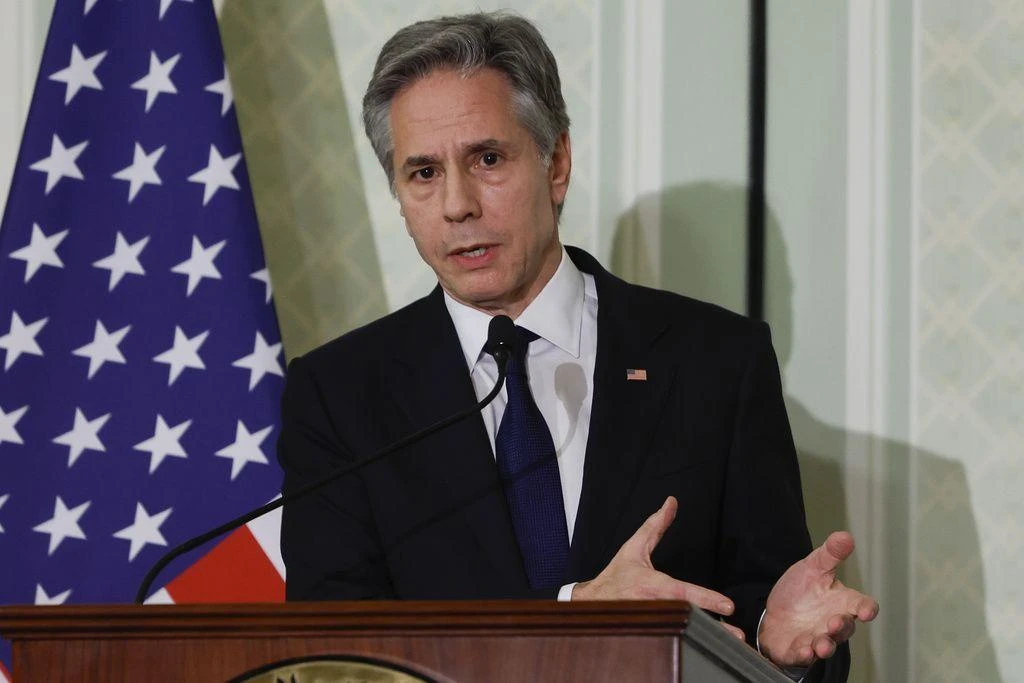U.S. Secretary of State urges caution in Israeli offensive plans, deeming Rafah operation as ‘mistake’

U.S. Secretary of State Antony Blinken emphasizes need for immediate, sustained ceasefire and release of Israeli hostages held by Hamas in southern Gaza town of Rafah
U.S. Secretary of State Antony Blinken’s latest remarks on Thursday have intensified the growing discord between the United States and Israel, as he cautioned against a major Israeli ground assault on the southern Gaza town of Rafah. Blinken, who is on his sixth urgent mission to the Middle East since the conflict began, emphasized that such an operation would be “a mistake” and unnecessary in dealing with Hamas, further underscoring the strained relations between the two allies.
Blinken’s statements came after meetings with top Arab diplomats in Cairo, where discussions focused on cease-fire efforts and plans for Gaza’s post-conflict recovery. He stressed the urgent need for an “immediate, sustained ceasefire” and the release of Israeli hostages held by Hamas, highlighting progress in narrowing the gaps through weeks of indirect negotiations mediated by the U.S., Egypt, and Qatar.
The Secretary of State is scheduled to meet with Israeli Prime Minister Benjamin Netanyahu and his war cabinet on Friday. However, expectations for productive discussions are clouded by the escalating disagreements between Netanyahu and President Joe Biden regarding the conduct of the war, particularly Netanyahu’s insistence on launching a ground assault on Rafah.
Netanyahu has argued that without an offensive in Rafah, Israel cannot achieve its goal of dismantling Hamas, citing the group’s deadly attack on October 7th and the subsequent hostage-taking as triggers for Israel’s military response. However, Blinken emphasized during a press conference in Cairo that a major military operation in Rafah would result in more civilian casualties and exacerbate the humanitarian crisis in Gaza.
The U.S. concerns were echoed by other officials, including Senate Majority Leader Chuck Schumer, who had previously condemned the civilian death toll in Gaza and called for new elections in Israel. Despite warnings from U.S. and other officials, Netanyahu remains resolute in his pledge to proceed with the Rafah operation.
Meanwhile, efforts to broker a cease-fire continue, with Blinken indicating that progress is being made in narrowing the gaps between the conflicting parties. However, Hamas’ rejection of a previous proposal and its presentation of alternative demands have complicated the mediation process.
As the conflict persists, the human cost continues to mount, with Gaza’s Health Ministry reporting nearly 32,000 Palestinian deaths since the war’s onset. Furthermore, U.N. officials have warned of an imminent famine in northern Gaza, underscoring the urgent need for humanitarian aid.
In response to the escalating crisis, Blinken convened with Arab ministers in Cairo to discuss strategies for increasing humanitarian aid deliveries to Gaza. Egyptian President Abdel Fattah el-Sissi emphasized the necessity of an immediate cease-fire and warned against the repercussions of an Israeli offensive in Rafah.
Amid these developments, the United States is pushing for a swift vote on a revised U.N. resolution demanding an immediate and sustained cease-fire to protect civilians and facilitate humanitarian aid delivery. However, Netanyahu’s rejection of calls for an independent Palestinian state complicates efforts to achieve a lasting solution to the conflict, a key requirement for Arab nations to normalize relations with Israel.
Despite the strained relations, efforts are underway to engage in dialogue, with Biden and Netanyahu recently holding a phone call and agreeing to send delegations to discuss the Rafah plans in Washington. However, with tensions running high and the humanitarian crisis deepening, the path to a resolution remains uncertain.
Source: AP



